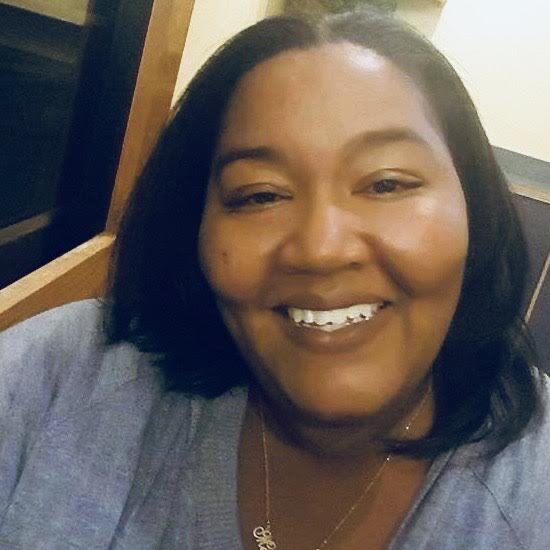
Honestly, if we’re healthy, if we’re all healthy and we can work, then we can build a better economy, which is I think the main point, right?
Marshawn Ford Rush, a 50-year-old mother of two sets of twins, lives in Omaha, Nebraska. She works as a program manager for a national nonprofit, helps run a small local nonprofit, serves as a community advocate, and teaches as an adjunct professor at a local community college.
Marshawn holds a bachelor’s degree in business administration with an emphasis on human resource management, a certificate in business leadership, and a master’s degree in organizational leadership. She is currently applying for a doctorate in human capital. All of this to say, she is an incredibly productive member of her community.
Throughout her life, Marshawn has relied on Medicaid. When she turned 18 and moved out of her mother’s home, she lost access to coverage. “I remember that I didn’t have any medical insurance…Medicaid stopped providing for you after you left your family’s house,” she said. For five years, Marshawn depended on what she called “medical coupons.” She sought out free clinics and looked for any opportunities for free appointments until 1998 when she became pregnant with her first set of twins and qualified for full coverage through Medicaid.
“If I didn’t have it, I wouldn’t have been able to have my children,” she said. “I was unable to have any type of prenatal care, any type of preliminary care prior to becoming pregnant. I just got pregnant and then I could afford insurance. I wasn’t fortunate enough to have a partner who had medical insurance at their job, who could even afford medical insurance at their job, so I was forced to take medical insurance to get Medicaid in order to even birth my babies.”
Marshawn recalled the intensity of that experience. “It was a set of twins. I can just imagine what that costs now versus what it cost then. I was a high-risk pregnancy. I had to see several high-risk doctors. Without Medicaid, I wouldn’t have been well. My children wouldn’t have been well. I don’t even know how I would birth them.”
Marshawn qualified for Medicaid again through the expansion program during the Covid-19 pandemic. But when her daughter, a college student, moved in with her, the state counted her daughter’s income as a part of the household’s, and denied Marshawn’s eligibility.
Marshawn has many ongoing health needs. “I am handicapped by the foot, and I had just had to buy a pair of shoes out of pocket for about $275 because I didn’t have any Medicaid,” she said. “It would have been totally covered if I’d had it.” She said her ability to attend appointments now depends on cost. “I can only go when it’s affordable. I can’t go when I really probably need to go.”
But for Marshawn, access to Medicaid was never just about her own care, but that of her loved ones and her community. “Even though over 70 percent of my family is fully gainfully employed, they still can’t afford medical insurance, co-pays, prescriptions. Without Medicaid, some of them don’t have coverage,” she said. “Most of us lose lapse in coverage until we find something else to help us cover it.”
Her mother, who is handicapped, recently needed additional coverage Medicare would not provide. “She was wondering how she would pay for it,” Marshawn said. “We’re constantly looking for medical insurance.” Her nephew, who is autistic, also has no coverage. She often finds herself pointing loved ones toward the Affordable Care Act just so they can get basic care. “Without that, I fear that there’ll be diseases and things that they didn’t know about that are festering and brewing in their bodies.” Her fears underscore the vital importance of preventative care over reactive care. “It’s absolutely essential for preventative care,” she said. “No one is just going to the doctor unless they have an income well over six figures, because they can. We only go when we can afford to go. And so, with the support of Medicaid, we would all be a lot healthier. We would all be a lot stronger individuals who could make a better society. Honestly, if we’re healthy, if we’re all healthy and we can work, then we can build a better economy, which is I think the main point, right?”
When asked what message she would give to elected officials about cutting Medicaid, Marshawn said, “It’s a necessity that we need to have to build a better America like we say we want to build, because we have to have healthy, thriving individuals to do that. And you cannot do it without insurance or health care coverage.”
Add your voice to help us continue to push for the best health and health care for all.
SHARE YOUR STORY